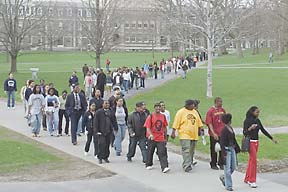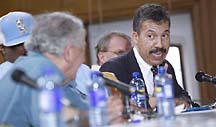Alumni panelists present views of Willard Straight takeover of 1969
By Franklin Crawford


There are as many versions to an event as there are witnesses, said James Turner, Cornell professor of Africana Studies and moderator for a panel discussion April 19 on the Willard Straight Hall takeover of 1969. That was certainly true during the first of a weeklong series of events marking the 35th anniversary of the historic student takeover.
The panel discussion was held, fittingly, in the Willard Straight Hall Memorial Room. The week's commemoration events were planned by a committee that included support and representation from: the Office of the Dean of Students, Ujamaa, the Multicultural Greek Council, Wari House, Black Students United, and the African, Latino, Asian and Native American Program Board.
Turner addressed an audience of about 200 people, mostly students of color, at the panel discussion, providing context for the event and introducing speakers. Turner said the 1969 takeover "continues to capture our imagination," even to create as much folklore as fact. Turner referred to an April 17 Ithaca Journal story that described the action as an "armed takeover" in which employees and families were evicted from the hall, reportedly at knifepoint.
"There was no armed takeover," Turner said -- nor were knives brandished during the takeover, he said. Weapons were later smuggled into the building, but only after reports of armed white students and the threat of police action circulated, Turner said.
Benjamin Nichols '41, a Cornell professor emeritus, recalled that in 1963 there were only five black freshmen on the Cornell campus, "and I knew all of them," he said. Nichols, a former mayor of Ithaca, served on the university's Committee on Special Educational Projects (COSEP) to improve recruitment and financial aid for students of color. Nichols recalled the frustrations of black students whose by-the-book efforts to improve academic conditions for black students at Cornell were repeatedly stonewalled by an all-white administration.
Kossouth Snyder '72 provided some levity to the Straight story with a disarmingly honest and comic "inside story" of the Straight occupation. In 1969, having attended an all-night dance party, he unwittingly, if enthusiastically, joined a call to "take over the Straight," he said. Snyder said all employees and parents were evicted without incident, except for the occupants in the last room they approached.
"We were very, very polite; we knocked on doors, and we said, 'We're students, and we're taking this over,'" he said. "There were no problems." That is, until the final eviction notice was served. An older naked man answered Snyder's knock -- and ... well, there was a young, naked woman, too. Snyder's description of the awkward encounter was hilarious. Other speakers at Monday's event included: David Burak '67, MFA '80, the former chair of the Students for a Democratic Society on campus and now an English instructor at Santa Monica College in California; and Donald Barr, professor emeritus of policy analysis and management.
Burak encouraged a nonviolent approach to furthering the gains made at Cornell since 1969, citing regrets later expressed by black activists over the use of guns and the setbacks caused by iconic images of armed blacks. Barr stated that most white students at Cornell still don't consider courses about African-American, Latino, Native American or Asian history relevant to them, even though shifting demographics are rapidly changing the racial makeup of America.
Three student panelists also spoke: seniors Shari Moseley and Amesika Bediako, and Kevin Edwards, a junior.
The panel discussion followed the screening of a documentary, titled "Cornell '69," which in its juxtaposition of grainy black-and-white images captured the zeitgeist of the times. The film was silent, save for the voice of Thomas Jones, A.B. '69, M.A. '72, apparently recorded shortly after the events. Jones was a student leader during the Straight takeover and now is a Cornell trustee emeritus.
Continuing the commemoration of the takeover, on April 20, a group of 80 or more students and faculty participated in a symbolic walk retracing the steps -- in reverse order -- of the armed students who exited Willard Straight Hall following the peaceful end of the occupation. The walkers gathered at the Africana Studies and Research Center on Triphammer Road, where organizers spoke and leaflets were distributed that described recent racial incidents in Ithaca and at Cornell. The group proceeded to Wari Cooperative on Dearborn Place, the cooperative for women of color, founded in 1910, and residents provided further commentary. The next stop was the former site of the original Africana center on Wait Avenue, destroyed by an act of arson in 1970. Standing on hillside steps that once led to the building, Turner said he remembered that night, watching the fire. He reminded the audience that many people consider the Willard Straight Hall takeover as a hostile act and the worst crisis in Cornell's history.
"But the occupation ended peacefully," Turner said. "The only act of violence during that time was at this place; the real violence happened here."
The marchers continued quietly across campus, ending on the steps of the Straight.
Media Contact
Get Cornell news delivered right to your inbox.
Subscribe